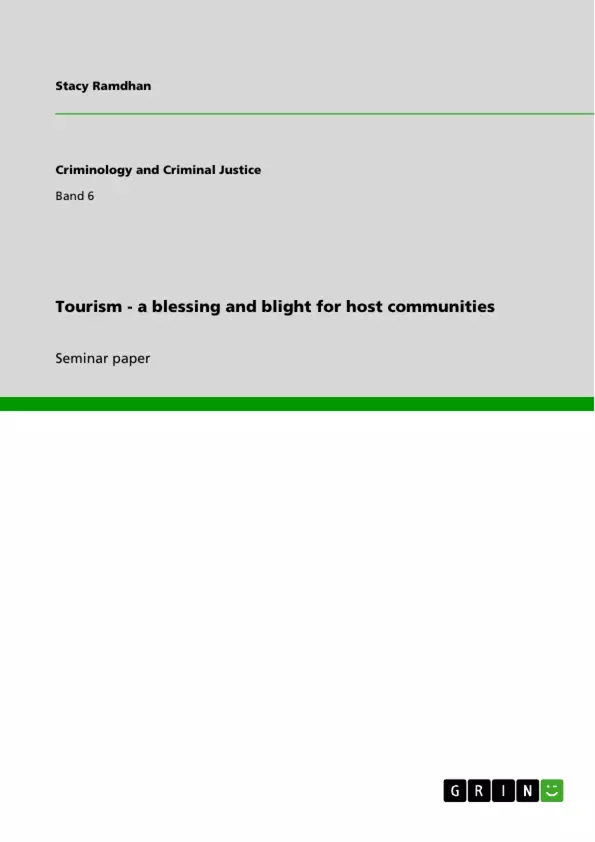The tourism industry is the world’s fastest growing industry and largest employer. In the Caribbean, tourism it is one of the largest and most dynamic industries. Given its economic importance, tourism has become fully incorporated in the deliberate development of Caribbean countries. In Trinidad and Tobago, tourism is one of the larger growing service sectors. Tourism has been identified as a sector that will play a critical role in the nation’s drive toward economic diversification and sustainability (TDC 2006).
The islands of Trinidad and Tobago are distinctive in both nature and appeal. While the duality presents a challenge for developing a logical approach for the country, it offers an incredible opportunity to create two distinctive tourism experiences, each competitive in their own right and is even more attractive if taken together.
Inhaltsverzeichnis (Table of Contents)
- Introduction
- Literature Review- 'Tourism both a blight and a blessing'.
- Theoretical Analysis
- Tourism as a blessing for Trinidad and Tobago
- Tourism as a blight for Trinidad and Tobago
- Policy Alternatives/Recommendations
- Conclusion
Zielsetzung und Themenschwerpunkte (Objectives and Key Themes)
The main objective of this work is to critically analyze the statement that tourism can be both a blessing and a blight for host communities, using Trinidad and Tobago as a case study. This analysis will explore the potential benefits and drawbacks of tourism, with a focus on the conflicts that arise between tourists and residents of host communities. The work will then propose policy alternatives and recommendations to address these conflicts.
- The impact of tourism on local economies and communities
- The potential benefits and drawbacks of tourism for host communities
- Conflicts arising between tourists and residents of host communities
- Policy alternatives and recommendations to mitigate tourism-related conflicts
- The importance of sustainable tourism practices in the Caribbean
Zusammenfassung der Kapitel (Chapter Summaries)
- Introduction: This chapter provides a definition of tourism and its various forms, as well as outlining the specific context of tourism in Trinidad and Tobago. The chapter also highlights the significance of the tourism sector to the economies of both islands.
- Literature Review- 'Tourism both a blight and a blessing'.: This chapter examines the existing literature on the complex and often contradictory impacts of tourism on host communities. It explores the arguments for and against tourism development, highlighting both the economic benefits and potential social and environmental drawbacks.
- Theoretical Analysis: This chapter delves into the theoretical frameworks that can be used to understand the relationship between tourism and host communities. It will likely explore concepts such as the "tourist gaze," "commodification of culture," and the "tourism-host conflict."
- Tourism as a blessing for Trinidad and Tobago: This chapter focuses on the positive impacts of tourism on the twin-island nation. It will likely highlight aspects like job creation, economic growth, cultural exchange, and the promotion of local heritage.
- Tourism as a blight for Trinidad and Tobago: This chapter explores the negative impacts of tourism on Trinidad and Tobago. It may discuss issues such as environmental degradation, cultural commodification, social disruption, and the displacement of local communities.
Schlüsselwörter (Keywords)
The main keywords and focus topics of this work include: tourism, Caribbean, Trinidad and Tobago, host communities, conflict, sustainability, development, economic impact, social impact, environmental impact, policy recommendations.
- Quote paper
- MSc Criminology and Criminal Justice Stacy Ramdhan (Author), 2011, Tourism - a blessing and blight for host communities, Munich, GRIN Verlag, https://www.grin.com/document/175649



